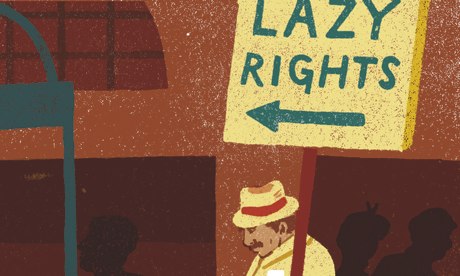
As we stumble again into the season of overindulgence – that sacred time of year when wine, carbs and sofas replace brisk walks for all but the most virtuous – a headline in the (excellent) new online science magazine Nautilus catches my eye: "What If Obesity Is Nobody's Fault?" The article describes new research on mice: a genetic alteration, it appears, can make them obese, despite eating no more than others. "Many of us unfortunately have had an attitude towards obese people [as] having a lack of willpower or self-control," one Harvard researcher is quoted as saying. "It's clearly something beyond that." No doubt. But that headline embodies an assumption that's rarely questioned. Suppose, hypothetically, obesity were solely a matter of willpower: laying off the crisps, exercising and generally bucking your ideas up. What makes us so certain that obesity would be the fault of the obese even then?
This sounds like the worst kind of bleeding-heart liberalism, a condition from which I probably suffer (I blame my genes). But it's a real philosophical puzzle, with implications reaching far beyond obesity to laziness in all contexts, from politicians' obsession with "hardworking families" to the way people beat themselves up for not following through on their plans. We don't blame people for most physical limitations (if you broke your leg, it wouldn't be a moral failing to cancel your skydiving trip), nor for many other impediments: it's hardly your fault if you're born into educational or economic disadvantage. Yet almost everyone treats laziness and weakness of will as exceptions. If you can't be bothered to try, you've only yourself to blame. It's a rule some apply most harshly to themselves, mounting epic campaigns of self-chastisement for procrastinating, failing to exercise and so on.
But who says it's correct? The philosopher John Rawls is often interpreted as saying it isn't. The fair society, he famously claimed, was the one we'd have constructed if we'd been behind a "veil of ignorance" – without knowing if we'd be born rich or poor, strong or weak, good at maths, or sports, or nothing. "We do not deserve our initial place in the distribution of native endowments, any more than we deserve our initial starting place in society," Rawls wrote. You don't deserve praise for being born sighted rather than blind, or growing up wealthy. Do we really deserve praise for having, or blame for lacking, "the superior character that enables us to make the effort to cultivate our abilities"? Two rival notions of willpower do battle among psychologists these days. One is that it's a learned skill. (You can, for example, teach children distraction techniques to resist temptation.) The other is that it's a depletable resource: if forced to use lots in one domain – resisting impulse purchases because you're poor, say – you'll have less left over elsewhere. Either way, it's something you might have less of thanks to luck or upbringing, not a magic power that lazy people inexplicably refuse to use.
None of which means effort should never be rewarded, or that it isn't sometimes strategic to make people – including yourself – feel bad: guilt's a great motivator. But when people fail to act in their own interests, moralising might not be justified. I'd start a movement to campaign for the rights of the lazy and weak-willed, but I suspect I'd have trouble signing people up.
oliver.burkeman@theguardian.com
Follow Oliver on Twitter

